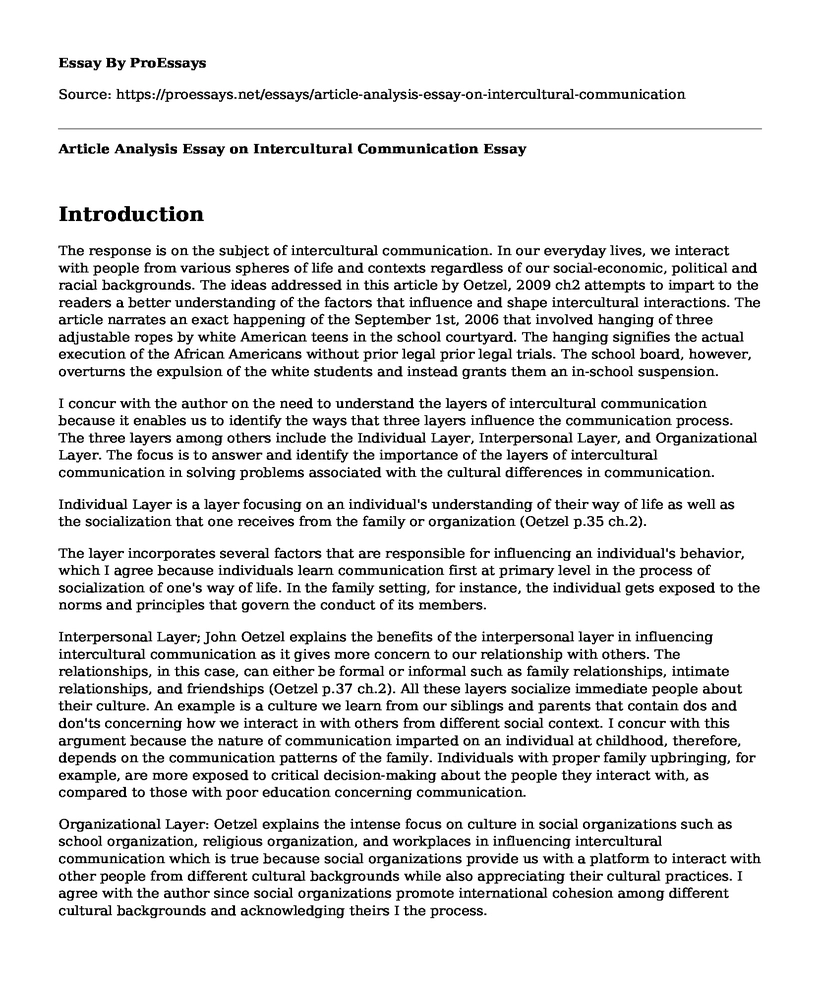Introduction
The response is on the subject of intercultural communication. In our everyday lives, we interact with people from various spheres of life and contexts regardless of our social-economic, political and racial backgrounds. The ideas addressed in this article by Oetzel, 2009 ch2 attempts to impart to the readers a better understanding of the factors that influence and shape intercultural interactions. The article narrates an exact happening of the September 1st, 2006 that involved hanging of three adjustable ropes by white American teens in the school courtyard. The hanging signifies the actual execution of the African Americans without prior legal prior legal trials. The school board, however, overturns the expulsion of the white students and instead grants them an in-school suspension.
I concur with the author on the need to understand the layers of intercultural communication because it enables us to identify the ways that three layers influence the communication process. The three layers among others include the Individual Layer, Interpersonal Layer, and Organizational Layer. The focus is to answer and identify the importance of the layers of intercultural communication in solving problems associated with the cultural differences in communication.
Individual Layer is a layer focusing on an individual's understanding of their way of life as well as the socialization that one receives from the family or organization (Oetzel p.35 ch.2).
The layer incorporates several factors that are responsible for influencing an individual's behavior, which I agree because individuals learn communication first at primary level in the process of socialization of one's way of life. In the family setting, for instance, the individual gets exposed to the norms and principles that govern the conduct of its members.
Interpersonal Layer; John Oetzel explains the benefits of the interpersonal layer in influencing intercultural communication as it gives more concern to our relationship with others. The relationships, in this case, can either be formal or informal such as family relationships, intimate relationships, and friendships (Oetzel p.37 ch.2). All these layers socialize immediate people about their culture. An example is a culture we learn from our siblings and parents that contain dos and don'ts concerning how we interact in with others from different social context. I concur with this argument because the nature of communication imparted on an individual at childhood, therefore, depends on the communication patterns of the family. Individuals with proper family upbringing, for example, are more exposed to critical decision-making about the people they interact with, as compared to those with poor education concerning communication.
Organizational Layer: Oetzel explains the intense focus on culture in social organizations such as school organization, religious organization, and workplaces in influencing intercultural communication which is true because social organizations provide us with a platform to interact with other people from different cultural backgrounds while also appreciating their cultural practices. I agree with the author since social organizations promote international cohesion among different cultural backgrounds and acknowledging theirs I the process.
Conclusion
In my view, I like the article of Oetzel on intercultural communication because he expresses his concern for the need to appreciate other people's culture in an attempt to avoid social problems in schools, workplaces and family settings through the layered and contextual perspectives.
Works Cited
Oetzel, John G. Intercultural communication. New York, NY: Allyn & Bacon, 2009, p.35
Oetzel. John G. Explaining communication processes in homogeneous & heterogeneous groups through individualism, collectivism & self construal. "Human communication Research, 1998
Oetzel, john G and Stella Ting-Toomey."face concernes in interpersonal conflict: A cross-cultural empirical test of the face negotiation theory" Communication research 2003, p.37
Cite this page
Article Analysis Essay on Intercultural Communication. (2022, Jul 29). Retrieved from https://proessays.net/essays/article-analysis-essay-on-intercultural-communication
If you are the original author of this essay and no longer wish to have it published on the ProEssays website, please click below to request its removal:
- Strategies to Achieve Each Goal Essay
- Essay on Ethical Issues and Challenges They Pose
- The Cons of Online Dating Essay Example
- Essay Sample on Frederik Willem de Klerk
- Essay Sample on Broken Windows: A Theory of Neighborhood Deterioration
- Food & Early Human Societies: Harari's Insight in Sapiens - Essay Sample
- Essential Soft Skills for Workplace Success: A Comprehensive Evaluation







